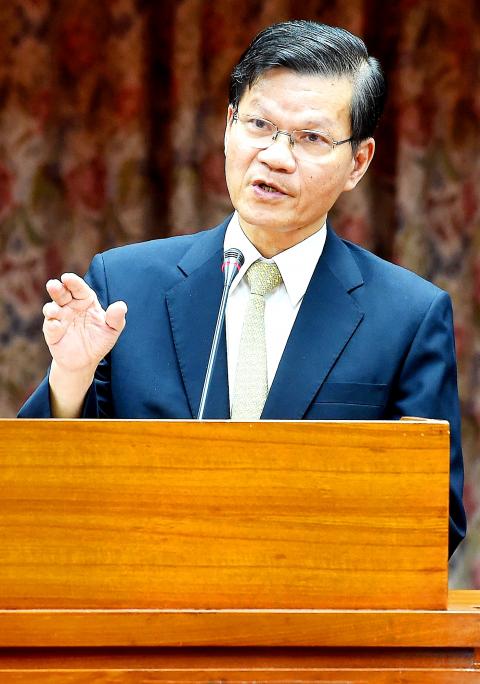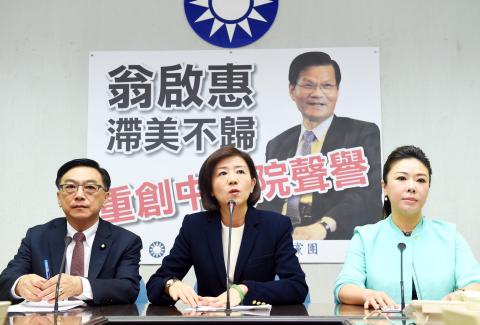A legislative committee yesterday adopted a resolution demanding that Academia Sinica President Wong Chi-huey (翁啟惠) return to Taiwan from the US as soon as possible to clear up a controversy in connection with alleged insider trading of a pharmaceutical company’s shares.
If Wong cannot return to Taiwan immediately, he should submit a written report to the Legislative Yuan’s Education and Culture Committee within one week, the resolution said.
He is required to deliver an oral report to the committee within one week of his return, it added.

Photo: Chu Pei-hsiung, Taipei Times
Wong, who is in the US for academic activities, had earlier said that he would return to Taiwan to attend a hearing on the case scheduled for yesterday.
On Tuesday, he called President Ma Ying-jeou (馬英九) to express his intention to resign from his post as head of the nation’s highest academic institution, citing health reasons, and tendered his written resignation on Wednesday.
Ma rejected Wong’s resignation and instructed him to return to Taiwan as soon as possible to report to him and the legislature, according to Presidential Office spokesman Charles Chen (陳以信).

Photo: Chien Jung-fong, Taipei Times
Academia Sinica is under the direct administrative supervision of the Presidential Office.
The controversy flared up following Wong’s endorsement of a new cancer drug by publicly listed biotech company OBI Pharma Inc (台灣浩鼎), even though the company announced on Feb. 21 that the drug had failed second and third-round clinical trials, news that sent the company’s stock price plunging.
Wong is a biochemist considered to be an expert on the theory behind OBI Pharma’s cancer drug.
On March 3, Wong issued a statement through Academia Sinica that he did not hold any shares in Taiwan’s biotech companies.
However, Next Magazine reported on Wednesday last week that Wong’s daughter, Wong Yu-shioh (翁郁秀), obtained 3 million OBI Pharma shares in 2012 at the price of NT$31 per share before it was listed on the emerging stock market.
The company was listed on the over-the-counter market at NT$310 per share the following year.
The revelation fueled accusations against Wong Chi-huey of a conflict of interests and possible insider trading.
An initial investigation found that Wong Yu-shioh sold more than 10,000 of her OBI Pharma shares three months before the announcement of the cancer drug’s trial failure.
Wong Chi-huey yesterday penned a letter addressed to his Academia Sinica colleagues.
“My personal affairs have lately became the subject of public controversy, with an impact on our institution’s reputation that is profoundly disturbing to me. I am currently abroad and physically indisposed, and I am therefore unable to attend our March 30 report to the Legislative Yuan,” he said in the letter. “I had tendered my resignation to the president and will, upon concluding my affairs abroad, immediately return [to Taiwan] to make an explanation [about this affair].”
“I will continue in the future to dedicate my professional knowledge to science and biotechnological research in Taiwan,” he added.

CHAOS: Iranians took to the streets playing celebratory music after reports of Khamenei’s death on Saturday, while mourners also gathered in Tehran yesterday Iranian Supreme Leader Ayatollah Ali Khamenei was killed in a major attack on Iran launched by Israel and the US, throwing the future of the Islamic republic into doubt and raising the risk of regional instability. Iranian state television and the state-run IRNA news agency announced the 86-year-old’s death early yesterday. US President Donald Trump said it gave Iranians their “greatest chance” to “take back” their country. The announcements came after a joint US and Israeli aerial bombardment that targeted Iranian military and governmental sites. Trump said the “heavy and pinpoint bombing” would continue through the week or as long

TRUST: The KMT said it respected the US’ timing and considerations, and hoped it would continue to honor its commitments to helping Taiwan bolster its defenses and deterrence US President Donald Trump is delaying a multibillion-dollar arms sale to Taiwan to ensure his visit to Beijing is successful, a New York Times report said. The weapons sales package has stalled in the US Department of State, the report said, citing US officials it did not identify. The White House has told agencies not to push forward ahead of Trump’s meeting with Chinese President Xi Jinping (習近平), it said. The two last month held a phone call to discuss trade and geopolitical flashpoints ahead of the summit. Xi raised the Taiwan issue and urged the US to handle arms sales to

State-run CPC Corp, Taiwan (CPC, 台灣中油) yesterday said that it had confirmed on Saturday night with its liquefied natural gas (LNG) and crude oil suppliers that shipments are proceeding as scheduled and that domestic supplies remain unaffected. The CPC yesterday announced the gasoline and diesel prices will rise by NT$0.2 and NT$0.4 per liter, respectively, starting Monday, citing Middle East tensions and blizzards in the eastern United States. CPC also iterated it has been reducing the proportion of crude oil imports from the Middle East and diversifying its supply sources in the past few years in response to geopolitical risks, expanding

Pro-democracy media tycoon Jimmy Lai’s (黎智英) fraud conviction and prison sentence were yesterday overturned by a Hong Kong court, in a surprise legal decision that comes soon after Lai was jailed for 20 years on a separate national security charge. Judges Jeremy Poon (潘兆初), Anthea Pang (彭寶琴) and Derek Pang (彭偉昌) said in the judgement that they allowed the appeal from Lai, and another defendant in the case, to proceed, as a lower court judge had “erred.” “The Court of Appeal gave them leave to appeal against their conviction, allowed their appeals, quashed the convictions and set aside the sentences,” the judges